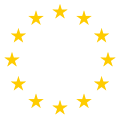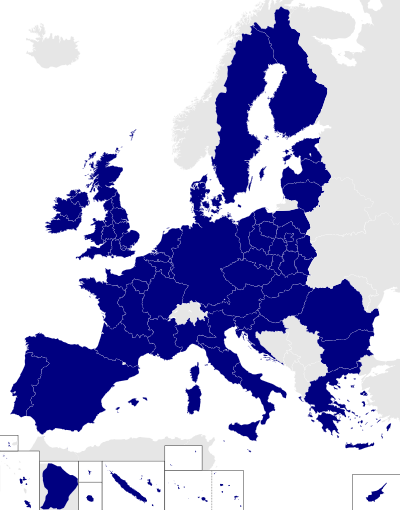Eurosocialism
| European Union |
 This article is part of a series on the |
Policies and issues
|
Modern European socialism,[1] usually known as European socialism [2] or simply Eurosocialism,[3] is the dominant version of social democracy in the European Union.[4] It is a centre-left political position drawing on social notions such as social progress, freedom, equality, solidarity and justice.[5] Socialism in Europe is primarily associated with the idea of progressive and social policies, which are mainly advocated by the PES and primarily opposed by the conservative and christian-democrat European People's Party. European socialists are defined (or define themselves) with one or more of the following terms: social democrats, liberal socialists, social liberals,[note 1] christian socialists, labourists and progressives. They support the values of europeanism and have the goal to establish a federal Europe.
PES Declaration of principles
The following declaration of principles has been adopted by the PES (Party of European Socialists) Council on 24 November 2011.
Preamble
"Socialism and Social Democracy have a long and proud history of achievement. The welfare state, universal access to education and to health care, and the struggle for fundamental rights have improved the lives of countless individuals and created more equal, just and secure societies. In the 21st century, our movement continues to shape a better future for all. Freedom, equality, solidarity and justice are our fundamental values. These universal values belong together. Democracy is a prerequisite to their full expression. Combined, our values form our moral compass to build progressive societies in today’s world. These are societies in which individuals do not struggle against each other but work together for the benefit of all. These are thriving, trusting societies which take care of their environment now and as an investment for the future. These are societies in which each and every person is able to create the conditions for his or her emancipation. Our values are being challenged. People, money, goods, information and ideas travel incessantly. But the reality of deregulated globalization provokes a more fragmented sense of living. Market forces, driven by finance and greed, are annexing huge amounts of power from democratic control. These forces serve the interests of a privileged few. Conservatives and neo-liberals, have deepened economic, geographic and social inequalities, promoting a system of short-termism, easy profits and loose rules that has led to the worst crisis in modern times. We reject the politics of pessimism that claim that nothing can be done. We reject the language of hate that makes people, and whole communities, scapegoats for the ills in societies. Instead, we work to build inclusive societies and a better future for all. We need a new progressive global agenda to enable the fruits of globalization to benefit all. This is a matter of political choice and responsibility."
Principles for actions
- Democracy must prevail in all areas of life to enable citizens to decide. Democracy must be pluralistic, transparent, truly representative of society’s diversity and enable everyone to participate, with an open public sphere, an independent media and free access to internet. Freedom of speech is fundamental to a democratic society.
- Strong public authorities all along the democratic chain, from the local, regional and national levels, to the European level of government, are essential. Together, they preserve the public good, guarantee the common interest and promote justice and solidarity in society. Good governance, the rule of law, accountability and transparency are the pillars of strong public authorities.
- We want to shape the future so that people regain control over their lives. True freedom means that people are active citizens, not passive consumers, empowered to build societies which have a richness that goes beyond material wealth, so that each individual’s fulfillment is also part of a collective endeavour.
- Decent work is the keystone in ensuring people are the architects of their future. Giving back a real meaning, a real value and a real continuity to work in life, is central to ensuring people's emancipation and sense of pride
- A society based on our values means a new economy that embodies them. Values-driven growth, means that environmental sustainability, human dignity and well being are fundamental to wealth creation. This new economy must foster social progress that raises living standards, secures homes and creates jobs. The public sector plays an essential role in this new economy.
- Our politics work to preserve the planet’s resources rather than exhaust them. Environmental sustainability means that we safeguard nature for present and future generations, not only in European cities and countries but across the globe.
- Our renewed vision of solidarity is a joint investment in our common future. It means lasting justice and solidarity between generations. It means we preserve the planet, protect the elderly and invest in young people. Access to universal and free education is a cornerstone in ensuring our children and grandchildren have the means for emancipation.
- A strong and just society is one that instills confidence and inspires trust. To guarantee this trust and confidence, we must ensure that the wealth generated by all is shared fairly. This collective responsibility embodies our conviction that we are stronger when we work together. It also reflects our determination to enable all people to live a dignified life, free of poverty. All members of society are entitled to protection from social risks in life.
- We foster a sense of belonging based on a confident inclusion of all and not the fearful exclusion of some. An open and inclusive society values the individual and embraces diversity. This means the same dignity, freedom and equal access to rights, education, culture and public services for all, regardless of sex, racial or ethnic origin, religion or belief, disability, sexual orientation, gender identity or age. In this society, religion is separated from the State.
- Building on the achievements of the feminist movement, we continue to fight for gender equality. This means that women and men equally share work, share power, share time and share roles, both in the public and in the private realms.
- Our shared pride in society guarantees our shared security. A free, peaceful and just society is one in which people are safe as they go about their lives.
- International solidarity means our political practice is always outward looking. Our solidarity goes beyond national borders. Ensuring long lasting prosperity, stability and above all, peace requires effective coordination in the international realm based on democracy, mutual respect and human rights.
Conclusion
"To put our principles into action in a world of economic, social and cultural interconnection, new progressive politics linking local, regional, national and European levels are needed to regain democratic control. A comprehensive approach to policy making that integrates all levels of governance is the guarantee to making each and every individual’s life more secure in the global, multi-polar age. A progressive, democratic European Union, with solidarity between European people’s and countries, reinforces democratic sovereignty on the national level on one side, and the international on the other. Our commitment to European integration transcends competition between countries and reflects our determination to oppose the erosion of social rights. It embodies our pledge to build a European Union with lasting common political, social and economic realities, not only provisional cooperation between governments. There can be no political decision making without democratic control, no economic Union without a social Union, and no social Union without a common budget to support investment and reduce inequalities in the European Union. Alongside a political and economic European Union, an integrated Social Europe is crucial to improve the living conditions for citizens, in all countries indiscriminately. Our historical task is to work towards a progressive harmonization within a political Union, making it a tool for justice and emancipation. A political voice that is truly progressive is needed in Europe. Unified action by the socialist, social democratic, labour and democratic progressive movement in the European Union and throughout Europe, and in cooperation with our partners within civil society and trade unions is required. The Party of European Socialists embodies these principles for action. Together, we will continue."
See also
- History of the socialist movement in the United States
- Chinese Socialism
- Socialism in India
- Socialism in Canada
- Socialism in Pakistan
Footnotes
- ↑ In Europe, supporters of classical liberalism are found in centrist parties, while supporters of other versions of liberalism are found also among conservatives and progressives. See Democratic Party (Italy)#Ideological trends, Socialist Party (France)#Factions etc...
References
- ↑ Modern european socialism
- ↑ What is a socialist?
- ↑ The left confronts modernity
- ↑ Robert Thomson (15 September 2011). Resolving Controversy in the European Union: Legislative Decision-Making Before and After Enlargement. Cambridge University Press. pp. 14–. ISBN 978-1-139-50517-8. Retrieved 9 August 2013.
- ↑ The 2011 Declaration of principles of the Party of European Socialists declares: "Freedom, equality, solidarity and justice are our fundamental values. These universal values belong together. Democracy is a prerequisite to their full expression. Combined, our values form our moral compass to build progressive societies in today’s world".

